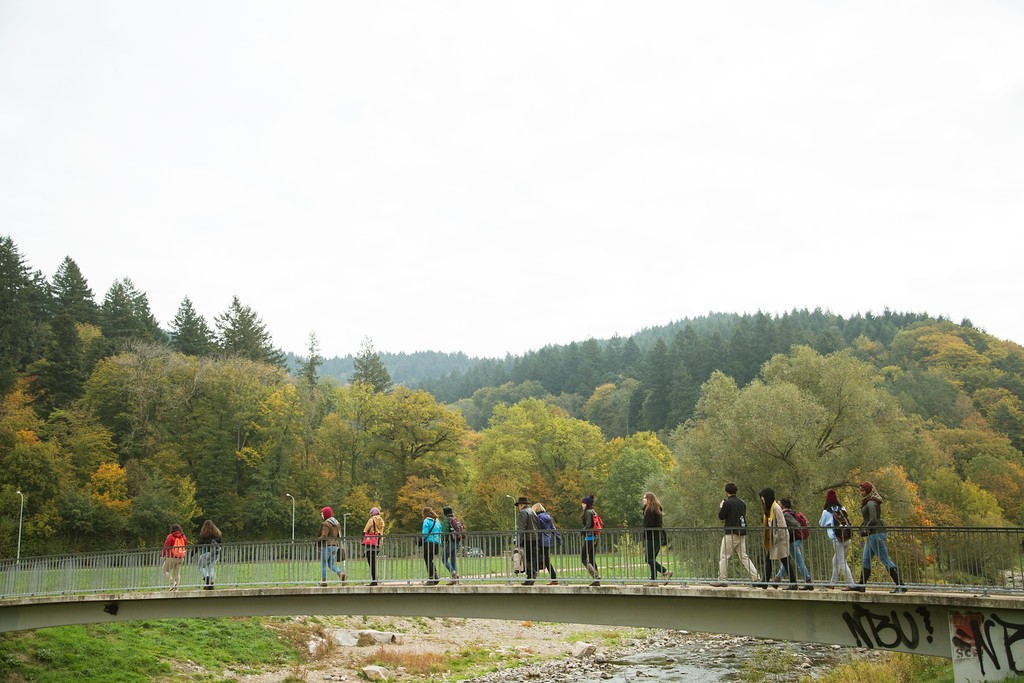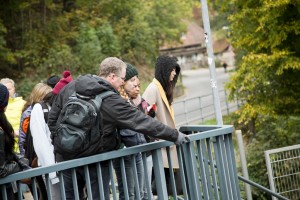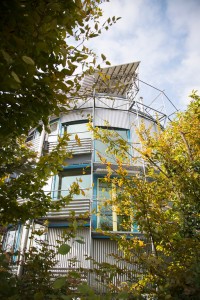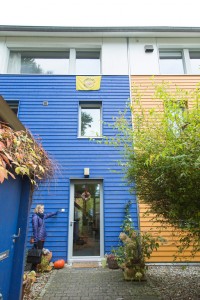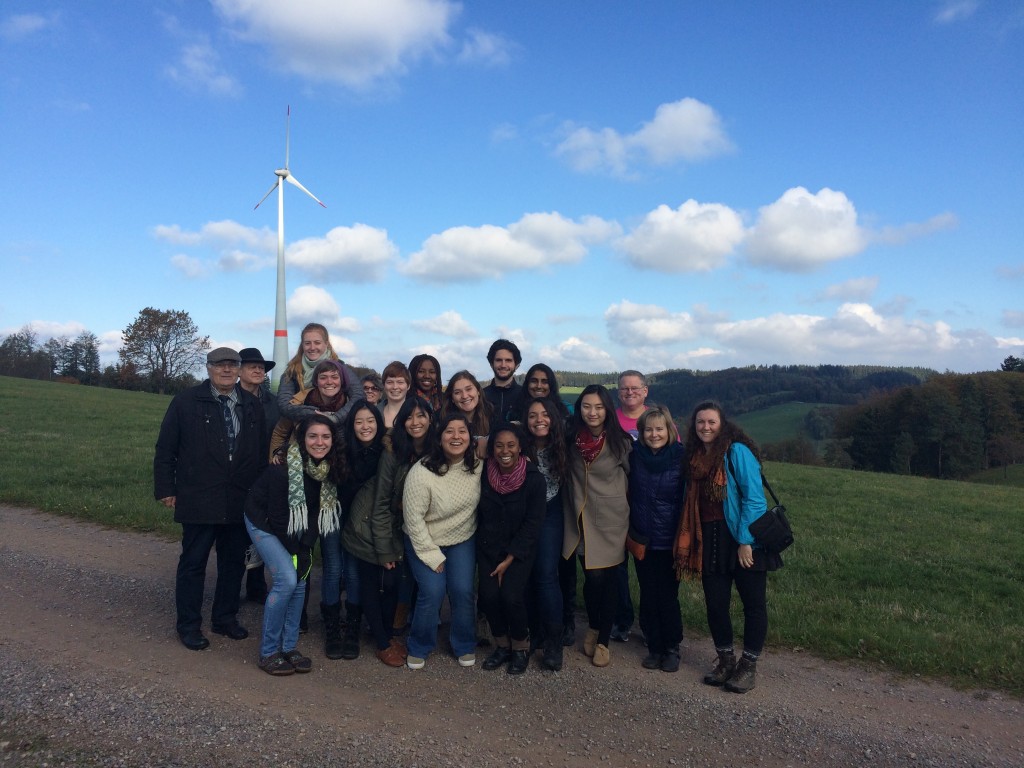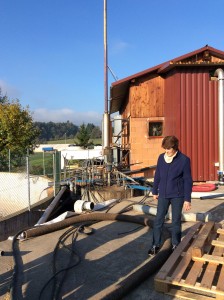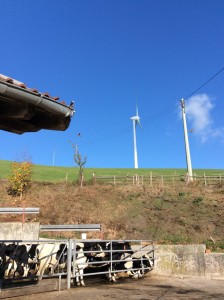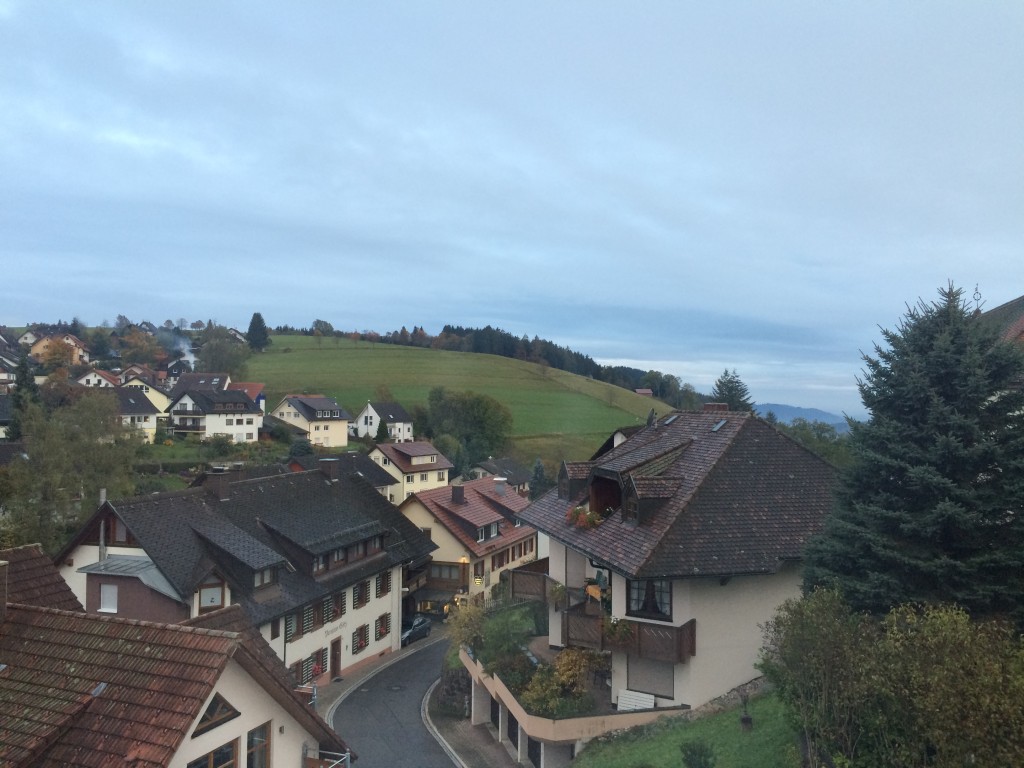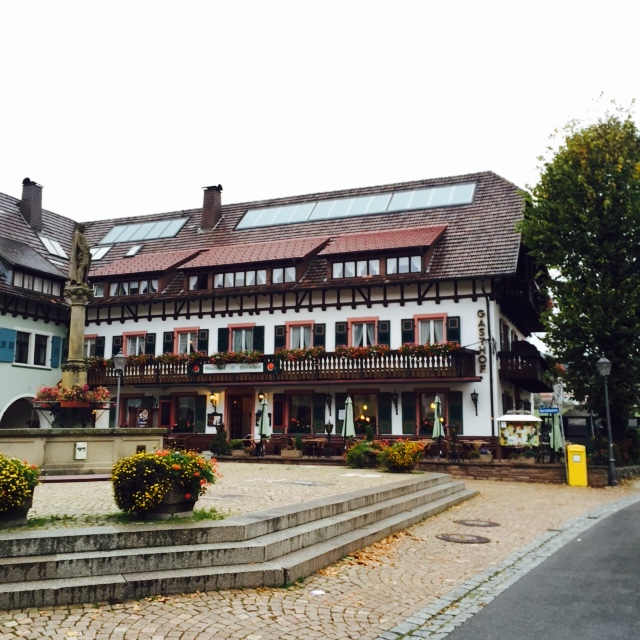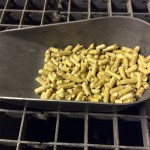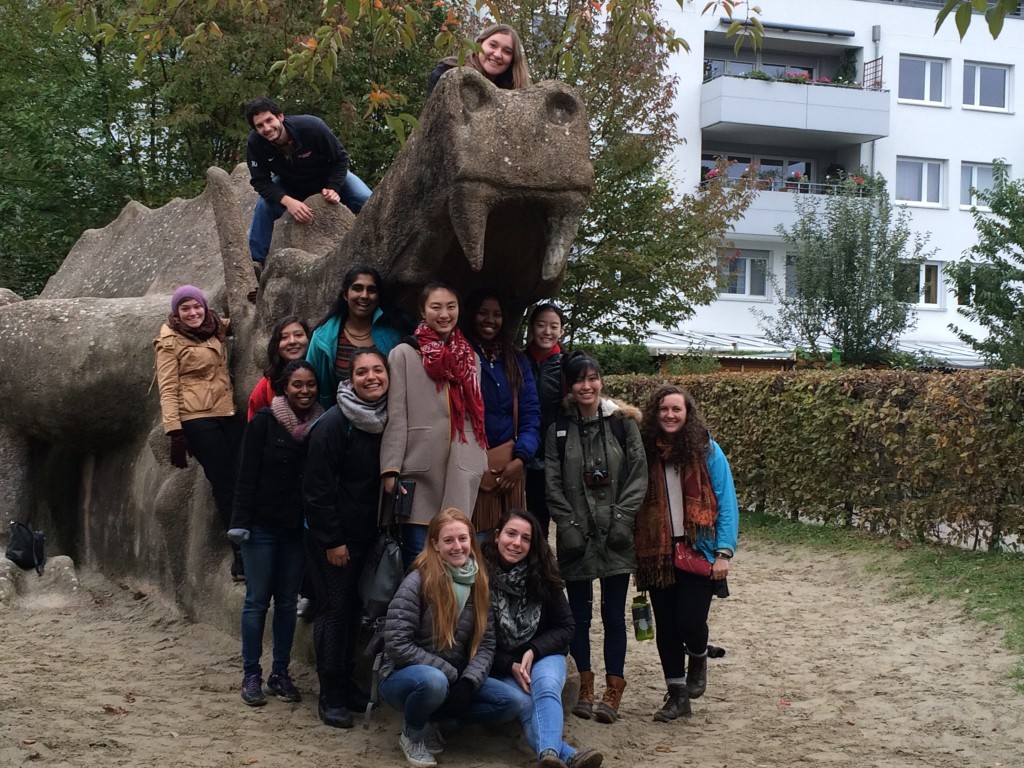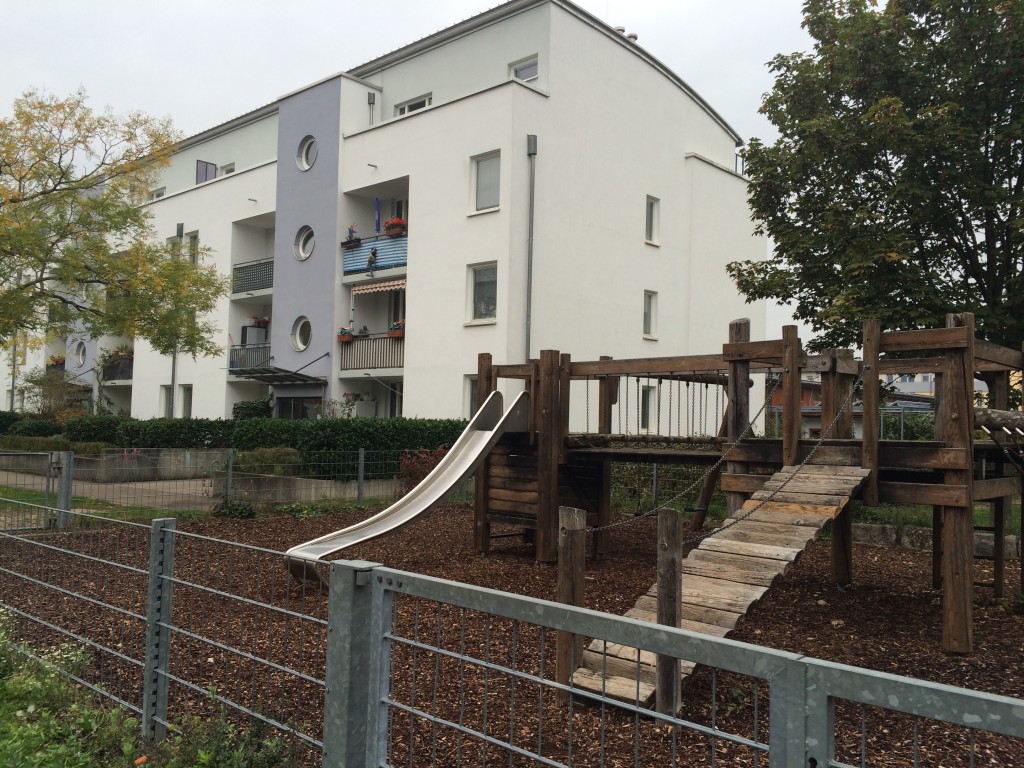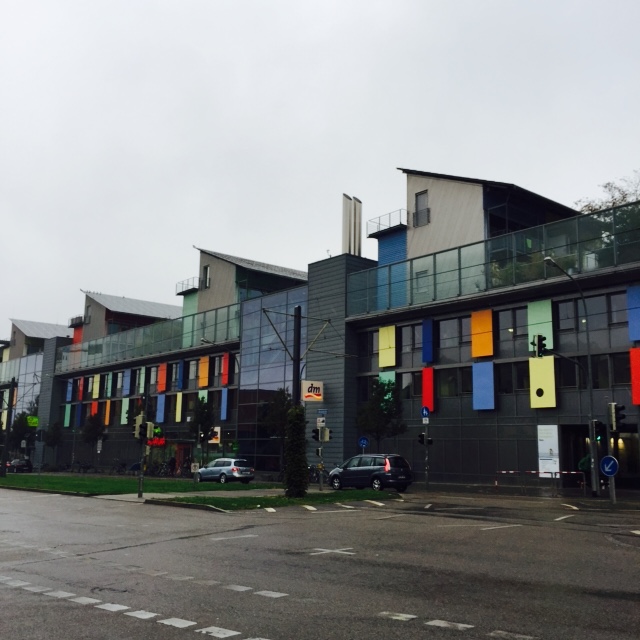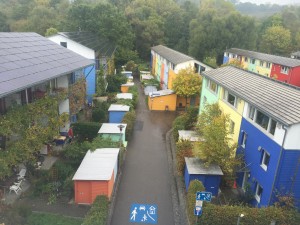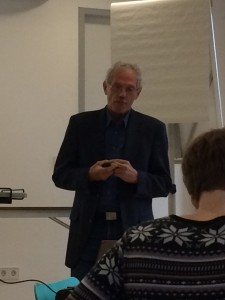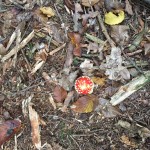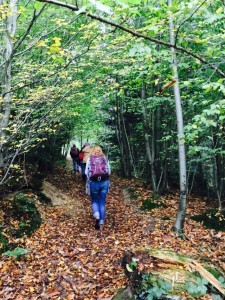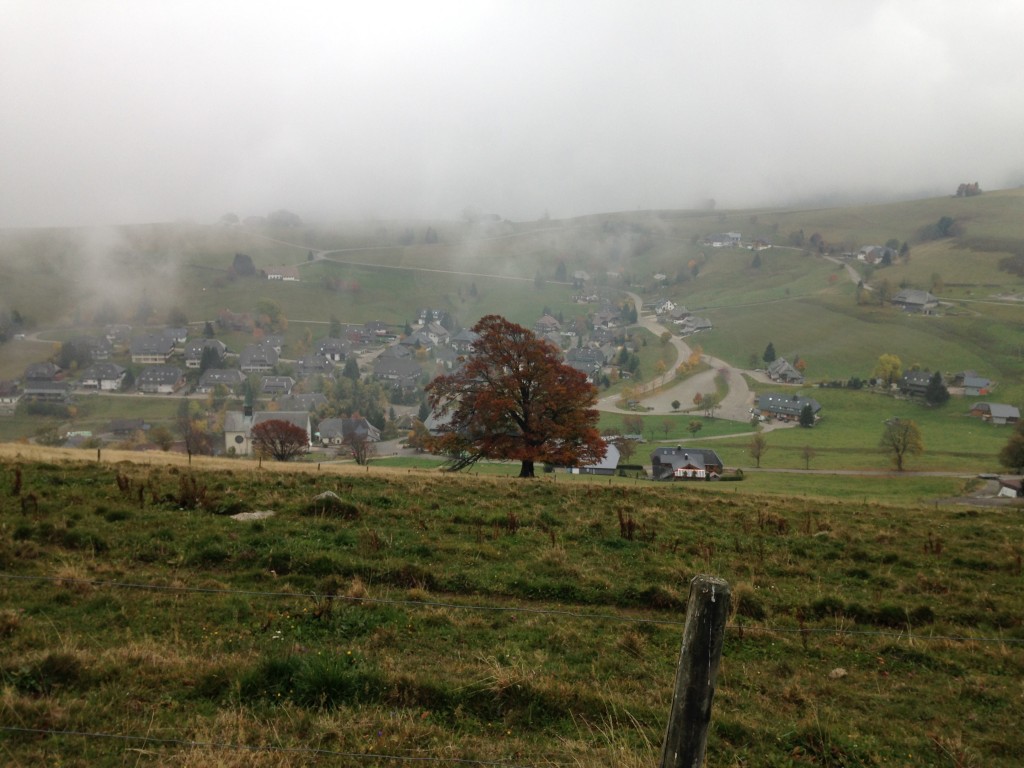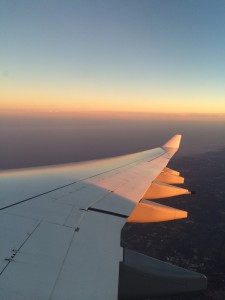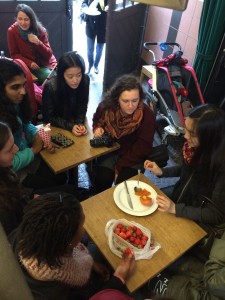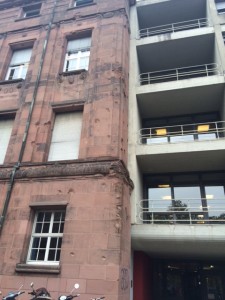New passport challenge
tests Bryn Mawr resourcefulness
but problem is solved.
Tag Archives: Travel
Getting on Board
On the morning of our last full day in Germany, we returned to Freiburg for tours of a variety of community led or inspired solar technology applications. After confusing the regular commuters on the bus (why were there so few seats and so many not-quite-awake Americans?) and again appreciating the efficiency of the regional train system, we met up with our morning guide. Hans-Jörg Schwander, a very tall bike enthusiast and president of the Innovation Academy board, led us via tram to the Schwartzwald-Stadion, where the Freiburg soccer team plays. It also happens to be the first international soccer stadium powered by solar panels. Jenille, one of our student commentators today, explained how it came to be: “Tickets were very popular, and solar panels were expensive, so they used a lottery scheme to get people to fund the solar panels, which gave them priority in getting season tickets.” “The seats were going to be sold regardless, so the SportClub proved there was enough demand that they could fund these solar panels through ticket sales, and used that asset. I’ve been so impressed by people being able to leverage things that already exist,” says Jeremy, today’s other interviewee. Though a little disappointing not to get onto the field, we were excited to see the team coming in for practice as we left the stadium and walked along the Dreisam river.
Hans and Professor Don Barber explained the various ways that the river, which had once been groomed into a straight and narrow channel to feed a hydropower plant, was being renatured. “Willows were planted to reduce bank erosion, rocks were placed to meander the river and oxygenate water for the fish,” said Jenille. “There are a lot of things you have to take into consideration – if there’s a lot of snow, then the water that comes down from the forest includes a lot of sedimentation, for example.” The river still leads to a hydropower station (currently closed for repairs), and runs through a park, with playgrounds and bike paths. Jeremy “loved the focus on biking, giving them the right of way, having that be the primary mode of transportation” that we have seen throughout our time here. He has also been struck by the children “riding tiny bikes on actual streets,” which feels like a different kind of learning opportunity than kids in the States have.
We picked up a different tram line, and returned to Vaubon, where we had visited the Oko-Institut on Thursday. We walked around the neighborhood, and Hans explained the planning of the community, where groups of people bought parcels of land and worked with architects to create sustainably-built homes and community gathering spaces. Jeremy told me that he was “happy to hear that there’s a very intentional process of seeking out communal opinions on things. Hans didn’t act like everything was perfect, though, because some people that live in the community are ‘black sheep’. I didn’t want it to be too glorified, if there are some issues, but I was happy to see community-based development thriving anyway.” Jenille found some echoes of classwork in this and the other intentional communities we visited over the course of our time here:
In Political Science, we’ve been talking about the bottom-up movement, and how culture influences peoples’ decisions. We’ve seen that a lot, over the past week, like in Wyhl. There are things that people decided, it’s very unified, and they aren’t waiting on the government. Togetherness and community came up in what Hans was talking about, with families sharing plots of land. It’s a family concept, not just your neighbor or your friend.
Our day ended with detailed looks at a couple of solar houses.
First, the Heliotrop, a house built by the architect who designed the Sonnenschiff (where the Oko-Institut is located), which revolves on its base to follow the sun. Jeremy was disappointed to learn that plans for Heliotrop Hotels haven’t gotten out of the planning stages, so keep your eyes out for his next entrepreneurial adventure. Then, we actually got to go into one of theEnergy Plus houses in the Sonnenschiff development, and speak with the owner of the house. “The whole concept is to reduce your consumption” observed Jeremy. When Jenille asked the homeowner what the advantages of living there were, she responded that it was the sense of community that meant the most to her. It doesn’t hurt that she earns about 3,600 euros annually from the solar energy she sells back to the grid.
We wrapped up the day with a conversation on a playground(college students are all about slides, I’ve learned) in the Sonnenschiff development, and said goodbye to Erhard, who gave us such a broad view of the different initiatives in and around Freiburg. As Jeremy and Jenille looked back over their time here, each noted that long term perspectives were particularly important to the work that has been done in the area. Jeremy “admired how the forest ranger said they make decisions on a 150 year cycle – that’s some forward thinking that is not in everyone’s culture.”
Tomorrow, we leave very early, taking a bus, a train, a train, a plane, a train, and a train back to campus. Of course, everyone will be very enthusiastic in Geology class on Thursday morning.
About our guest commentators:
Jeremy Graff Evans is a sophomore at Haverford College, likely majoring in Political Science, with minors in Environmental Studies and International Studies, but he’s not quite ready to put a label on anything yet. He was awakened to the threats to global stability of climate change through a high school course, and felt this 360 was an ideal way to explore the problem further, using the cluster to informer both personal and career decisions. He is on the basketball team at Haverford, and when not at practice, manages to find time to sing in the S Chords (an a capella group on campus), sit on the Committee for Environmental Responsibility and the Rufus Jones Leadership Institute Board, and work at the fitness center. All that, while spending most of his academic time at Bryn Mawr this semester.
Jenille Scott is a junior Biology major at Bryn Mawr College, originally from Jamaica. She plans to go into environmental law after graduation, and was excited to mix the science and politics (a true liberal arts perspective!) of Climate Change in this 360. Her list of campus commitments is long, and includes President of BACASO, supervisor at Erdman Dining Hall, and Green Ambassador.
Getting Sunshine (Finally!)
When we woke up this morning, there were hopeful hints of blue skies behind the clouds, and by the time we had boarded our bus (the only private transportation we’ll take the entire trip), there were definite rays of sunshine. Today’s itinerary included several farms and other sites off the beaten track, including a series of windmills in the Freiamt region.
The community of Freiamt produces 200% of its electricity needs (twice as much as it needs each day) from renewable energy sources. We started our day by visiting a biogas plant that makes use of co-generation technology, allowing it to produce both heat and electricity by fermenting grass and manure gathered from the land, then burning the gas. The plant produces over one million kilowatt hours of electricity annually, and heats 19 apartments and the local elementary school.
The second farm we visited is more self-contained, where the wood pellet heating system is used to heat the house, and freshly collected milk is used to warm the household hot water (another example of heat transference co-generation). “This is apparently a 20-year-old technology that everyone has, and it’s mind blowingly obvious,” Mercedes explained. Reflecting further on the contrast between today and the rest of our trip, she notes “they have all of these technologies… at these places that are still farms. In my head, farms aren’t industrialized. But the idea that we have to use everything, in a pre-modernized lifestyle, is following this new sense of energy and renewable resources. We have all this stuff that we’re using so that it doesn’t go to waste. In Philosophy [class] we’ve talked a lot about modernization being finding new ways of needing unnecessary things. In this sense, [the renewable energy] technology is being created so as not to be wasteful, which is super cool.”
Rina, our other commentator, also found a lot of opportunities today to think about the bigger picture: “In class, Professor Dostal got us thinking about how much we are supposed to depend on technology, but I’ve realized that it’s all human connections that make this technology work. 108 people contributed to fund [one of] the wind turbine[s] we visited,” which is just a piece of technology. In class, the discussions have been around whether the possibilities include a human/technology co-existence or co-dependence, and whether human ability will be taken over by technology, or will be able to keep it in check. Rina thinks the success of Freiamt may mean that the connection is a balanced one.
The second half of our day was spent in the neighboring villages of Wyhl and Weisweil, home of the anti-nuclear protests of 1974 we’ve been referring to throughout the trip. Professor Carol Hager has done substantial research in the region, and she had the opportunity to present on her recently published book (NIMBY is Beautiful) to some of the people who are featured in it. First, though, we met with the vice mayor, who gave a brief overview of the protests. Rina has been impressed at the access to interesting people we’ve been granted, mostly through the connections of our faculty, and the Innovation Academy. “We got to talk to these bad ass women who kept a nuclear plant from being built – it’s everything we tell ourselves [as Mawrters] we want to be and everything we are told we can be, and the vice mayor was just there, telling us about it,” she said, about the interaction we had with the Women of Wyhl, who formed the backbone of the protests, since their bosses were more lenient, and their families were depending on their success.
After the book party, on our bus ride home, the class chatted about their takeaways from the day. These conversations often compare the German approach to US policy, but Mercedes realized that “our tours have been in villages and smaller places. We keep trying to apply things from St. Peter to Boston, but you’d have to get to a smaller suburb to draw the parallel. Going back to citizen engagement and involvement, the lessons here can’t be applied just anywhere.” Though it sounds a little down, she suggests that each community is an opportunity for someone to figure out the right set of circumstances and incentives to effect change in that particular space. Tomorrow, we will have more opportunities to learn about such initiatives, as we tour a solar-powered soccer stadium, a hydropower plant, and return to the community of Vaubon, for a look at the inside of an energy positive house.
About our guest commentators:
Mercedes Aponte is a sophomore, planning to declare a Geology major and Environmental Science minor. She was encouraged by past 360 students to look into the program, and thought this cluster would be a good way to explore her interest in Geology. Her hula hoop skills are pretty legendary, and she’s convinced she could light a lightbulb just by hula hooping, given the right energy gathering equipment. In other news, she almost fell into France at the Rhine today.
Rina Patel is a sophomore Growth and Structure of Cities major, originally from Chicago, where she used to host a game show for the largest science center in the western hemisphere. The show was called “It’s Predictable,” and she had a Bob Barker microphone. Her interest in 360s dates all the way back to her very first Bryn Mawr event, a presentation about the Modern Art 360 at the Art Institute of Chicago, where she sat with Jiji Plecha, of all people. Though her original plan was to just take the Political Science class, her Dean and Professor Hager convinced her that the whole 360 was worth it. She agrees.
Getting a Break
Today was our free day – planned to give everyone the chance to catch a breath, re-orient to our time in St. Peter, and get ready for our last few days in Germany.
First, though, we had a breakfast meeting with two local community leaders, responsible for spearheading the wood pellet heating plant we visited yesterday, and other green initiatives in St. Peter. Coco, today’s guest commentator, notes that “the major incentive to join the program was an economic one. We’ve talked a lot in the past few days about how economics are an important incentive to get people to jump on the bandwagon. Even in a small village where everyone knows everyone, you would think people would be influenced by personal relationships, but the economic incentives are still the thing that gets them to join up.” Werner Rombach, who also owns the hotel where we’re staying, highlighted the involvement of key players, like the monastery, the school, and hotels, who were all early signers-on and whose standing in the community lent credibility to the project.
Coco has also been struck by the particular situations we have encountered in the Freiburg area, and in St. Peter. “After looking at the whole industry of green projects, it feels like each project has its own unique features and it’s only possible in that exact place, time, and with that group of people… we think it’s the technology we want to learn from [as students] but the techniques and conversations are much more important.” When I mentioned this to Professor Hager this afternoon, though, she was quick to emphasize that every community has a particular situation which can be shaped to the advantage of green-minded activists.
In reflecting on her experiences thus far, Coco said, “the whole trip carries the feature of ‘living the good life,’ which in this sense is living an environmentally friendly life – walking places, taking public transportation.” From take out boxes actually the size of the leftovers they contained (very small) to the consistency with which she’s seen people using the public recycling collection bins to the number of baby carrier bike attachments she’s encountered, Coco has found lots of places to train her eco-lensed mind, and she is excited by the pride she sees people taking in these efforts.
After our conversation at the Burgerstuble, the students (and faculty) scattered to a variety of local activities – a folk music festival in the next town over, clock shopping in Freiburg, hiking in Waldkirche, visiting a village on the Rhine (and waving at the French border), a Monteverdi concert in the monastery of St. Peter, and probably quite a few naps. We will reconvene tomorrow for more meetings with local leaders, a few farm tours, and a book party for Professor Carol Hager’s new publication, “NIMBY is Beautiful.”
About our student commentator:
Coco Wang is a senior Philosophy and Political Science double major at Bryn Mawr College. Right around the time applications for this 360 were available, she came across Under the Dome (the documentary on air pollution), which got her thinking about how people live in their environments, damage them, and don’t do anything about it. As an international student from China, often considered the largest polluter in the world, she wanted to tie the policy to the science of climate change, to better understand the actual problems being discussed. She was also excited to get to travel with both of her major department chairs, and her Senior Class Co-President (Chanel). Yesterday brought the most excitement she’s had all semester though, because it actually snowed.
Don’s Daily Haiku
Quote
Train, bus and our feet
carry us into cool clouds
where sun is now weak.
Getting Solar
I’m writing from the lobby of our hotel, where there’s a jazz combo playing in the lounge on the other side of the wall, celebrating the 140th anniversary of the Victoria’s founding, and the 30th anniversary of the current owners’ proprietorship. We aren’t attending the fancy dress party, but I’m happy to be taking advantage of the great music.
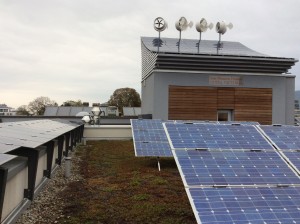
Photo-voltaic cells, wind turbines, and water heating cylinders on the roof of the Hotel Victoria (Dostal)
This morning, we had the opportunity to get a behind-the-scenes look at greening improvements made by the owners to the Victoria, making it a carbon neutral hotel. “It’s interesting that the hotel doesn’t seem any different when you walk in. There’s nothing that requires effort on the part of the guest” said Annika, in comparison to our previous conversations at Innovation Academy about making sure constituents understand and engage with technologies and practices comfortably.
We climbed to the roof to view the solar panels and tiny wind turbines, then trekked to the cellar to see the wood pellet burning heating system.
Our other guest commentator, Catherine, said that “this trip has made me realize the creative ways people are harnessing technologies that don’t occur to me, in ways that aren’t much harder than what we’re already doing.” Professor Don Barber was also able to share that some of the same cooling technology here is used at a Haverford athletic facility, which students will be able to visit on our return.
Our next tour was of Riesenfeld, which Catherine described as “a responsible community.” Once the open collection ground for the city’s sewer systems, the land was was intentionally reformed, “from the design contests about how it was going to be laid out, to all the different ways the architects made the structures energy efficient.” Annika notes that “it’s also important that there was a competition – it was digging into the skills that architects had to make it green. It was an important publicity element.” From four-story apartment buildings to single family homes, everything in the development has solar panels, insulated walls, and other eco-design features. There are green spaces, creeks, and many many playgrounds between rows of houses, all with pedestrian zoned walkways and bike storage sheds.
Catherine wondered about the circumstances that arose to allow such a project, though, and whether they are applicable elsewhere: “That takes a lot of time and effort, and a specific way of thinking about how to build a community and systems that will allow that kind of thought and intention [to living sustainable].” Annika also picked up on an interesting parallel, that “this region that focuses on sustainability also focuses a lot on children and childhood education in general, and specifically on sustainable practices, even though the population of Germany is aging.” Riesenfeld does have a central gymnasium (high school) and several kindergartens (primary schools) around which the housing developments are built, as well as a community center and ecumenical church right next to the tram stop. The focus is clearly on young families, who may find it less expensive to live here than closer to the city center.
Our last stop of the day was on the other side of Freiburg, at the Fraunhofer Institute for Solar Energy Systems, which is the largest solar R&D institution in Europe, and Annika’s favorite visit thus far. “I was a little upset that I’m not a natural science major or engineer today because I couldn’t contribute to their work, and I’m so excited by it.” Catherine found the visitor’s hall (where prototypes are displayed and photos are forbidden) “like being at Stark Industries, and [she] was geeking out a little bit.” We were given an overview of the kinds of projects the Fraunhofer undertakes, and the four areas of focus for their energy research: efficiency, conversion, distribution, and storage. Then our tour guide took us outside to the hydrogen fueling station, where we got to see a prototype of a zero emissions car, and Annika had some concerns.
“I was a little disappointed by the car… it looks like a normal car, but it has zero emissions, which was cool. But I feel like the issue is actually where the car parts are coming from, how they’re being manufactured, with what fossil fuels, and the impact that the car has before it’s even driven off the lot. And I asked the tour guide about it, and she was really focused on the zero emissions nature of the car. Looking at it more holistically, there’s a long way to go.”
Catherine added that “this trip is really focused on how communities do things, but what we use still has to be produced somewhere, and a lot of the production is done in an irresponsible way.”
Tomorrow morning, we leave Freiburg for St. Peter, a small mountain village about 20 km from the city, where we will sleep for the rest of our trip (though we’ll be back to visit other sites in Freiburg on Monday and Tuesday next week). I asked the students to reflect on their experiences thus far, and Annika brought up the vastness of climate change as an issue. “In class we’ve talked about problems now, and things that will occur and [the trip] has been helpful in making the issue much more accessible. Policy is implemented on national, state, and local levels, and seeing that [play out in Germany] has been more inspiring than a lot of the broader and gloomier readings we’ve done in class.” The stories we will hear in St. Peter (including our meeting tomorrow with a farmer who went out and bought a wind turbine because he was tired of waiting for the town to get one) bring that accessibility to an even more personal level, especially because Professor Bob Dostal has been living part time in the village for over a decade.
About our guest commentators:
Annika Cole is a sophomore International Studies major at Bryn Mawr College. She grew up surrounded by environmentally conscious and active adults, and was drawn to this 360 because she wanted to incorporate that education and awareness fostered in her into her curricular pursuits. As you may be able to tell, she’s having a great time on this trip, but she really loves her horse, and looks forward to riding again when we get back Stateside.
Catherine Rowen is a sophomore at Bryn Mawr College. She used to have nightmares about climate change as a kid, though she’s cooled down since then (unlike the planet!). As an archaeology major, she has been concerned that her studies focus on things that happened in the past to dead people, and was excited that this 360 gave her the opportunity to engage on these issues and a sense of what she could do as individual to make a difference. When she isn’t figuring out how to apply what she’s learning to archaeology, she’s playing cello in Blacktop, a band on campus.
Getting Philosophical (with Science Majors)
“Science is not the end of the story. It’s the beginning, really.” This is the through-line our two guest commentators, Jasmine and Nicole, found for today’s lectures in and around Freiburg. We began with an overview of Freiburg from a sustainable development perspective, given by our guide yesterday at the Innovation Academy, Steffen. Some of the Growth and Structure of Cities majors were particularly struck by his slides about the central train station, which is really constructed as a transportation hub. Regional trains, local trains, tram lines, and bus routes all converge there, but the complex also includes a bike parking building, and the car share garage. We also heard about the ways in which people are trying to teach children about recycling and sustainability, so that it will become ingrained (“and they’ll help influence their parents as well,” notes Jasmine).
We then hopped on a tram to Vauban, the neighborhood which used to house the French army barracks (until they left in 1992), and has since had a series of rejuvenation projects, aimed at increased sustainability. The Öko-Institut headquarters are in a zero-energy office building, which is part of a complex we’ll visit next week that includes many single-family homes and some apartments, as well as a supermarket and other office space.
The Institut was born out of the anti-nuclear protests in the mid-70s, and provided a space for anti-nuclear scientists to gather and publicize research. It “was privately funded at the beginning… it’s amazing that they were able to gather so much momentum even though they weren’t government funded. They were able to get so many citizens involved, so much support, and now they have all these contracts [across the EU for private companies and various governments] to do research and projects” explained Nicole.
“When we think about the United States, and especially the climate policy, it’s very political and very divisional,” she observed, so she asked the Institut’s co-founder Professor Doktor Rainer Grieshammer about lobbying done by the Institut or other groups on behalf of the Energiwende (energy transformation) cause. He shared that there isn’t a particular lobby group for these issues, they are just part of the general political conversation. Jasmine’s course last year with Prof. Hager about policy in Brazil, China, Germany, and the United States pointed to Chernobyl as a major uniting factor in German politics, which has been echoed by every conversation we’ve had with experts here in Freiburg.
Nicole has also found that “over the past couple of days we have talked a lot about spreading risk. The forest service doesn’t rely on one kind of tree, and a lot of the talks today embrace that idea as well. If the source diminishes, you need to be able to counteract that with something else.” Our afternoon meeting, with Andreas Markowsky, founder of the Ökostrom-Gruppe, gave students insight into a distinctly economic approach to the Energiewende: the company Andreas runs coordinates local investment in renewable energy generators. This means that when a wind farm or hydroplant is constructed in a town, individual citizens have the chance to invest financially in the technology, and earn returns based on the energy generation. “It’s not just sustainability from an ecological standpoint – it’s economic and social too. It’s interdisciplinary!” said Nicole.
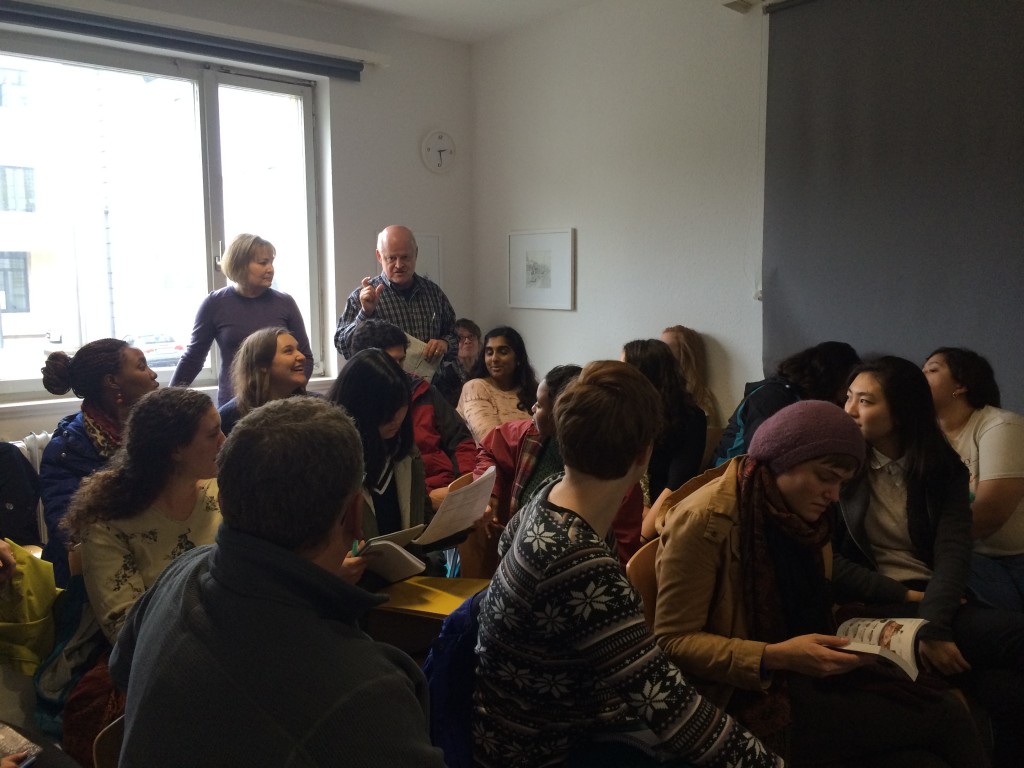 Check in again tomorrow for notes from our visit to a landfill-turned-residential community, and another research facility.
Check in again tomorrow for notes from our visit to a landfill-turned-residential community, and another research facility.
About our guest commentators:
Nicole Hamagami is a senior at Bryn Mawr College. She has been itching to participate in a 360, and was excited to look at the science of climate change from a variety of perspectives. As a Biology major, she learns a lot about scientific absolutes, and has appreciated the opportunities to explore some grey areas. She’s also a campus tour guide, and looks forward to sharing new insights on the Sustainability Tours she gives to prospective students.
Jasmine Rangel is a junior Chemistry major at Bryn Mawr College. She has always been interested in the energy side of chemistry, and a middle school teacher got her passionate about nature, but she was excited to learn more about how people react and respond to new technologies, science, and information in general. Jasmine is also a Traditions Mistress, so while we are in Germany, she’s in the midst of planning Lantern Night too (November 1 – get your lanterns ready!).
Getting up (and around and over and down and back around) a Hill
I am pleased to report that everyone made it to breakfast this morning, resilient, despite jet lag. After bundling up to face the brisk and cloudy day, we joined our guide from Innovation Academy on a tram ride out to the Forstamnt, about fifteen minutes from the city center.
This is the city-owned edge of the Black Forest, which is in and around Freiburg, meaning that about 40% of the city proper is covered in trees.For our tour of the forest, we were lucky to be hosted by the head ranger, who oversees all the ecological projects and maintenance of the local forest. As he led us up groomed paths and through new growth forest, both of today’s student commentators, Chanel and Meghan, were surprised to hear that “land use isn’t bad, as long as you use it in a sustainable way”. We learned that the forest is both an economic and cultural resource to the region – every five to six years, a single tree in a given section is cleared and sold for timber. Each selection is made after careful analysis of the surrounding growth, consideration for the biodiversity, and value of the wood in question.
In the States, we learn about the differences between conservation and preservation, and I have always considered myself a conservationist. Seeing this perspective, though, has suggested to me that we can and should interact with the land, because it’s there and it’s to be used. It’s interesting to try to have this balance of nature and natural approaches, but in order to keep that, everything has to be actively monitored. How much is it a natural progression and how much do we keep it the same? -Meghan
As our conversation went on, Chanel wondered whether the analytical and economic approach makes the Forstamnt more of a farm than a forest. “They are cultivating things specifically, and it’s all about yield, and what you can extract.” This new perspective on land use and protection of forests will give the students a new lens through which to analyze public policy, they think.
The ranger also emphasized that the forestry work they do is a very long-sighted project. Decisions they make today won’t have particularly visible impacts for 50-60 years, but the citizens are told to trust their expertise. Meghan found this a lot like some of the policies suggested to developing nations – technologies that might raise standards of living are discouraged because industrialized countries have experienced and abused them in their own pasts.
After a few more modes of public transportation, including a gondola ride (shrouded in mist, usually offering a lovely view of the city and surrounding valleys), and a lunch of goulash and spatzle, we hiked to the top of Schauinsland, the highest mountain owned by the city (though not the highest in the region). It also boasts a climate monitoring station with the longest continuous atmospheric CO2 record in Europe – they’ve been keeping data since 1972. Here, the students had a chance to learn about the equipment in use and the different organizations using the data collected there. Chanel noted that one of the scientists there made a similar point to an oft-mentioned concern in their readings, that there is “a difference in improvement of air quality and greenhouse gasses,” the latter being a global problem that “some countries don’t take seriously,” said the scientist.
We left the climate monitoring station and hiked up, over, past goats, around, through a cow pasture, and down the mountain to visit Schneiderlihof, an old farm house now set up as a museum highlighting the farming traditions of the Black Forest. Although the farm wasn’t necessarily sustainable in its functioning days, Meghan sees the self-sufficient mindset of that past carried forward to the present day relationship Germans have to nature and their forests.
Tomorrow, our day is a little more indoors and a little less uphill, as we meet with the founders of the Öko-Institut, a research collective vital to the region’s leadership in sustainable and anti-nuclear energy development.
About our guest commentators:
Meghan Wingate is a junior Political Science major at Haverford College. Growing up in Vermont, she was always casually involved in environmental groups and activities, but coming to Haverford solidified her academic interest too. She regularly wears her environment love on her sleeve, whether she’s studying policy, playing Ultimate with the Bi-Co Sneeches, or working on the Haverford Farm.
Chanel Williams is a senior at Bryn Mawr College. She is a Growth and Structure of Cities major, and also a past 360 participant (read about her class experiences in Hamburg here). As a student from the Bahamas, this cluster was particularly interesting because case studies on the Maldives covered in the Political Science course are echoes of the Bahamanian situation. She’s also an avid swimmer and water polo player, so she has high hopes for global sea level rise.
Getting There
The flight to Frankfurt is short, compared to other international jaunts, but add in a two-hour train trip and we have been traveling for a long time. Jiji Plecha, ’18 had felt that “the materials in class have been really clearly related to what we’re going to talk about here on the ground,” but nowhere was that more clear than when she found a personal screen at every airplane seat. “The Philosophy course has been focused on how technology is so deeply integrated into our lives, and when we got on the plane, there were monitors in everyone’s faces.” Of course, some of us spent time looking out the windows anyway.
Though the group did some “getting to know you” exercises before departure, Jiji has been struck by “how much the social groups within the cluster have loosened,” giving everyone a new sense of closeness. She notes that this overlapping is happening in their academic perspectives as well, as they learn from each other’s diverse disciplinary backgrounds.
After arriving in Freiburg, and leaving our luggage at the hotel, we traipsed around the city, led by Professor Bob Dostal (Philosophy), whose research has regularly brought him to the University of Freiburg throughout his career. Jiji notes that the city is different than others she’s encountered in Europe, “because there was so much fighting for influence and jurisdiction, there isn’t a consistent feeling across the city. You can see that particularly in the architecture. Some of the buildings look like they could be in France, which of course, they could be, since we’re so close to the border. The living history of still-bullet-riddled buildings is also striking.”
When we visited the Munster (the medieval cathedral in the center square), “it was interesting to hear about the way the communities came together to take care of the art during the war – taking the stained glass out of the cathedral to preserve it.”
Our evening ended with a group dinner at a traditional German restaurant in the main square – students tried spatzle, as well as a local twist on the classic noodle and a variety of game (wild boar, venison, veal). The winner of the evening, though, may have been the pumpkin soup. Before turning in, Jiji and I chatted about what she’s most looking forward to this trip. As it turns out, she spent part of her junior year of high school researching and writing about biogas digesters, so our visit to a biogas plant next week will be an exciting opportunity to see the concept in person.
Tomorrow, we hike a hill and meet our institutional hosts, the Innovation Academy. Here’s to a full night’s sleep and a good German breakfast!
About our guest commentator:
Jiji Plecha is a sophomore at Bryn Mawr College. She was drawn to this 360 after her ESEM (titled Environmental Social Problems, taught by Sociology professor Nate Wright) helped her to understand how closely the scientific study of environmental issues is related to the sociological and political perspectives. She’s also been long drawn to Philosophy, and enjoyed a previous class with Bob Dostal. When not vascillating between a major in Sociology or Philosophy, she can be found working as a theater technician and stage manager.
Getting Ready
After six weeks of classes, several hundred pages of articles, and one excellent faculty-hosted dinner of German soups and cakes, the fifteen 360 students and their three faculty are finally zipping up their suitcases and double checking passports. While their colleagues and classmates catch up on grading, participate in an externship, or nap with vigor, we will spend Fall Break in Freiburg, a German university town with a history of progressive environmental policy and innovation. Working with Innovation Academy, a local educational non-profit, our group will meet with local activists, scientists, and politicians. Our itinerary includes visits to a working farm, the oldest meteorological collection station in the country, and a solar-powered football (soccer) stadium.
I’m along for the ride as well, to keep track of the train tickets, and to open a window into the meetings and hikes the students take. As the 360 Program coordinator, I’ll endeavor to give you a sense of why we visit the places we do, and each day we will have student commenters to tie their on-the-ground experiences to the academic work they’ve been working on all year. Hopefully, we’ll also be able to show you the beautiful south-west German autumn.
You can catch us on social media under #bmc360. If there are things you’d like to know more about, please ask! Thanks for joining us on this adventure.

